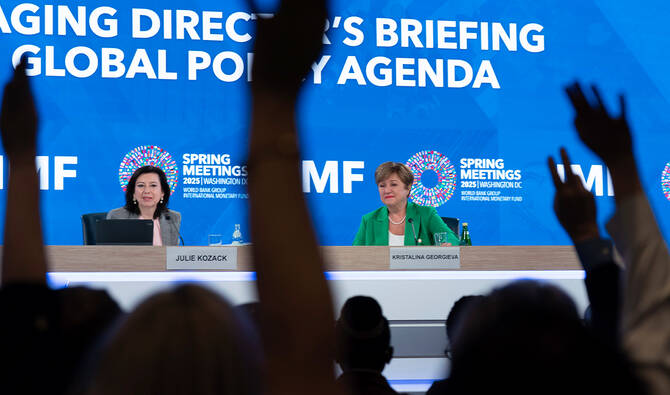
Global Trade Policies in Flux
The recent Spring Meetings of the International Monetary Fund (IMF) and World Bank, held in Washington, concluded with limited clarity on the future direction of global trade policies. Despite numerous discussions, economic leaders expressed concerns about the lack of concrete progress on key issues, particularly regarding U.S. tariff policies under President Donald Trump. The uncertainty surrounding these policies has left global finance leaders apprehensive about the potential impact on international trade and economic stability.
U.S. Tariff Policies and Global Economic Impact
One of the central topics of discussion was the U.S. administration’s stance on tariffs. President Trump’s imposition of significant tariffs on various goods, including a 25% levy on vehicles, steel, and aluminium, and a 10% tariff on most other goods, has raised concerns among international trade partners. The IMF and World Bank have warned that these protectionist measures could reduce global growth prospects, particularly affecting developing economies already grappling with high debt burdens and sluggish productivity growth.
Limited Engagement with U.S. Officials
During the meetings, international officials found it challenging to engage with key U.S. figures, such as Treasury Secretary Scott Bessent. Despite receiving numerous trade proposals, the U.S. administration emphasized patience in resolving trade disputes, particularly with countries like Japan and South Korea. This lack of direct engagement has contributed to a sense of uncertainty and frustration among global economic leaders.
Rising Global Debt Concerns
Another significant issue discussed was the escalating global debt levels, especially in developing countries. The IMF and World Bank highlighted that many nations are facing increasing debt servicing costs, diverting critical funds from essential sectors such as education and healthcare. This situation exacerbates inequality and hampers development efforts, raising alarms about the long-term economic implications.
U.S.-China Trade Relations
In the context of U.S.-China relations, Treasury Secretary Bessent confirmed that economic discussions between the two countries are ongoing, despite China’s public denials. He emphasized the importance of de-escalation on China’s part to mitigate the ongoing trade war, which poses significant threats to global economic stability. However, public confidence in President Trump’s economic leadership remains fragile, with many questioning the effectiveness of the current approach.
Global Economic Outlook
The IMF and World Bank have revised their global growth forecasts downward, citing high global policy uncertainty and rising trade tensions as key factors. While the IMF does not foresee immediate recessions, many officials expressed deeper fears about the long-term economic harm of sweeping U.S. tariffs and other protectionist measures. The situation remains fluid, with high stakes for both developed and developing economies.
Conclusion
The conclusion of the IMF and World Bank meetings has left global economic leaders with increased anxiety and scepticism toward U.S. economic leadership. The lack of clarity on trade policies, rising global debt concerns, and ongoing geopolitical tensions underscore the need for renewed international cooperation and dialogue to address the pressing economic challenges of our time. As the global economic landscape continues to evolve, the actions taken by major economies will play a pivotal role in shaping the future of international trade and economic stability.




































Leave a Reply